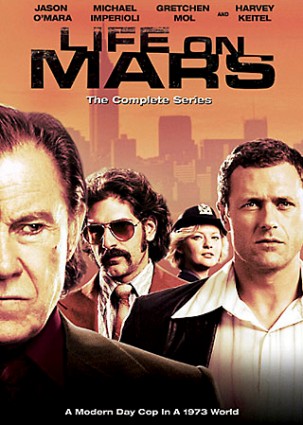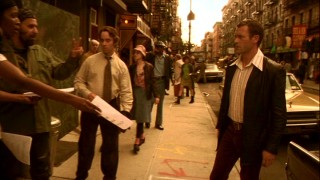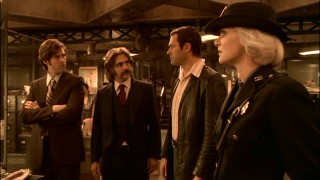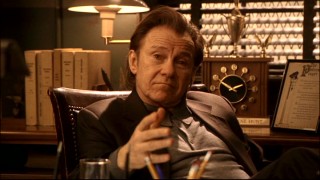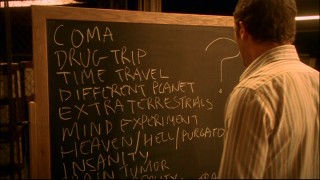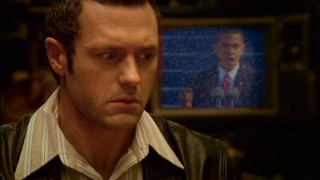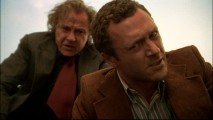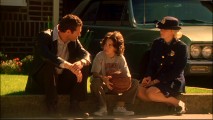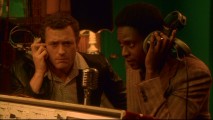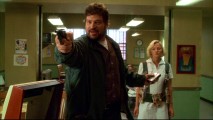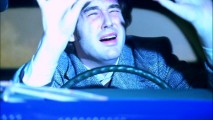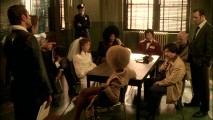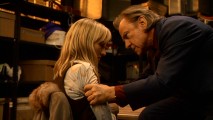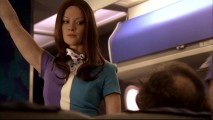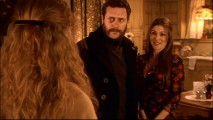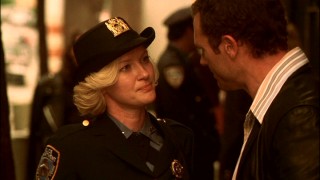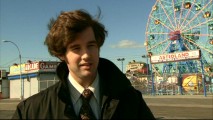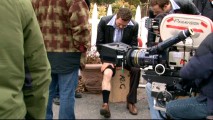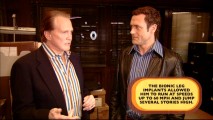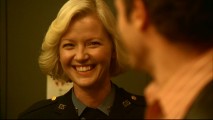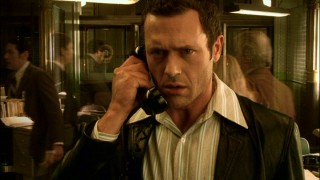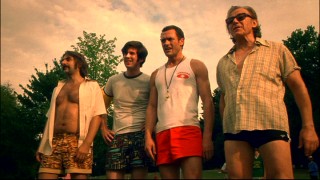"Life on Mars": The Complete Series DVD Review
One moment, New York City police detective Sam Tyler (Jason O'Mara) is investigating the disappearance of his girlfriend in the present day. The next, he is hit by a car and instantly, inexplicably sent back to 1973. Tyler doesn't immediately know where, or more accurately when, he is, but he's recognized as the new transfer to the NYPD's 125th Precinct and settles into the job he's used to. The jump back thirty-five years, however, does entail drastic changes in working procedures. Computers are nowhere, women are marginalized, forensic evidence is limited, lab work takes weeks, and there's drinking on the job. Suspects are regularly roughed up and, depending on their mood, witnesses are antagonized or buttered up.
Filled with questions that can only be answered by the theory that he's in an alternate reality, Tyler becomes part of a procedural police drama whose distinguishing feature is its period setting.
"Life on Mars" impresses more as an ambitious recreation of the past than as a crime drama. Never before in a long-form TV series has so much attention been paid to setting and detail. The cars, the clothing, and all of the set dressing help you to experience the same temporal relocation that Sam Tyler has. Even the language and attitudes feel authentic. Predating political correctness, it's not just the miscreant expressing views we today recognize as racist or homophobic. Some of the cultural references feel a bit forced, but even they are easy to appreciate.
One of the biggest benefits to the setting is that it opens the door to arguably rock 'n roll's greatest era. The show makes liberal use of late '60s and early '70s music. Nearly a hundred songs are featured throughout the season. Among the most effectively-placed anthems are The Who's "Baba O'Riley", The Rolling Stones' "Out of Time", Simon and Garfunkel's "I Am a Rock", T-.Rex's "Get It On (Bang a Gong)", Bowie's "Starman", Cream's "White Room", The Moody Blues' "Go Now", and, from Elton John, "Rocket Man" and "Mona Lisas and Mad Hatters." Near the end of the run, prominent song titles and lyrics twice stand as episode titles. (Similar homages don't guarantee song usage earlier in the season.) The show is not just a parade of chart-toppers and greatest hits, either. Less familiar songs feature throughout and carry that distinctive sound that unnecessarily but welcomely reinforces the time setting.
That Sam Tyler is from the twenty-first century is not just some premise gimmick; it lends the show a slight but ever-present science fiction twist. This angle provides the most opportunity for the series to get hokey, as when Sam is getting some mysterious cosmic phone call or seeing tiny robotic vehicles rove into his mouth. But even when they clash with the hard-edged crime investigation around it, such trifling moments aren't hard to forgive. The comedic value of the conceit is neither overplayed nor squandered; like Marty McFly, Tyler's visitor from the future status provides occasional hilarity, as when Vanilla Ice's "Ice Ice Baby" saves his life.
I appreciate that Sam's fantastic situation is not kept much a secret. A lesser show could milk that notion for seasons to come. He isn't given the straightjacket, background check, and bill of insanity that reality might bring. But, met with healthy doses of skepticism, he earns the nickname "Spaceman" and his divergent methods are explained in that he's "from Hyde."
Hints to Sam's actual predicament appear to lie in space-time continuum glitches. The fascinating concept that seems to take shape is that he is fully living in 1973 New York while apparently laying comatose in his real life. His girlfriend/work partner Maya (recurring Lisa Bonet of "The Cosby Show") is his (and our) connection to his world, always inspiring a reunion that seems distant and, by the nature of the series, improbable. The season/series-long mystery -- "what is real?" -- unfolds on the fringe. Unfortunately, the resolution doled out in the final five minutes of the series finale is one you question how everybody could have signed off on, even with foreshadowing clues dropped here and there. If you have any regard for the series up to that point, you'll probably want to forget what serves to undermine all the fine ideas and engaging drama that preceded it.
The majority of our time is spent with Sam and the officers of the 125 as they solve crimes. Per TV drama, all of these are riveting and remarkable. Always the lead and rarely absent from a scene, Sam is the clear good guy, who's unwilling to play by 1973's archaic rules. Playing successfully to type, Harvey Keitel is tough, white-loafered "Lieut", Lieutenant Gene Hunt, who sips from a flask and makes his own rules. It does seem like the period setting is of greater interest to the show's makers than week-to-week plots. "Life on Mars" can be slow in stretches and not all of its crime stories are as sharp as they should be. Generally, the success is proportional to the degree of human interest. Episodes involving Sam's parents, who in 1973 are around the same age as him, play out less conventionally and more poignantly than ones dealing with routine hoods and crime lords.
This "Life on Mars" remake received good marks from critics. But despite claiming timeslots after two of ABC's biggest heavyweights ("Grey's Anatomy" in the fall, "Lost" in the winter), the series never got the kind of ratings it needed, taking a steep dive in its second week and never recovering. (The two-month mid-season hiatus probably didn't help.) The show was cancelled, and its seventeenth episode would be its last, something producers were (fortunately or not) apprised of when making it. Seventeen episodes is one more than its British predecessor got, although those came over the course of two seasons (the UK keeps seasons trim, a model that makes sense creatively) and inspired spin-off series "Ashes to Ashes", which will soon begin production of a third season.
Not long ago, a show cancelled after one season was considered done and unlikely to resurface anywhere (legally at least). Now, thanks to DVD, that is no longer the case. Last week, Disney/ABC's home entertainment division released The Complete Series as the tail end of the studios' fall TV DVD blitz. The 4-disc set holds all 17 episodes with, and this is both expected and essential, all that pre-recorded music retained. Despite running just a few episodes shy of what most of today's shows consider a full season, the lighter than usual disc count on "Life on Mars" is reflected in a list price that is $20 below the tags carried by its hour-long ABC brethren. (Update: A subsequent price drop has put this 4-disc DVD at catalog movie prices, with only a $23.99 SRP.)
Red stars ( Disc 1
2. The Real Adventures of the Unreal Sam Tyler (42:00) (Originally aired October 16, 2008)
3. My Maharishi Is Bigger Than Your Maharishi (43:11) (Originally aired October 23, 2008)
Disc 2
6. Tuesday's Dead (43:06) (Originally aired November 13, 2008)
9. Take a Look at the Lawmen (42:04) (Originally aired January 28, 2009)
Disc 3
10. Let All the Children Boogie (42:54) (Originally aired February 11, 2009)
11. Home Is Where You Hang Your Holster (43:07) (Originally aired February 18, 2009)
13. Revenge of Broken Jaw (43:10) (Originally aired March 4, 2009)
Disc 4
14. Coffee, Tea, or Annie (42:55) (Originally aired March 11, 2009)
15. All the Young Dudes (43:03) (Originally aired March 18, 2009)
17. Life Is a Rock (43:11) (Originally aired April 1, 2009)
VIDEO and AUDIO
Like just about all of its contemporaries, "Life on Mars" comes to DVD in 1.78:1 anamorphic widescreen and Dolby Digital 5.1 sound. The series has a slight and (I'm guessing) deliberate grain look that aligns with the period setting without lessening the viewing experience. BONUS FEATURES, MENUS and PACKAGING
By length, the biggest supplement is four audio commentaries spread throughout. These vary in quality.
Developers/executive producers Josh Applebaum and Andrι Nemec are compelling in their two-man chats of "Out Here in the Fields" and "The Man Who Sold the World." They offer full discussions, covering their intentions, the show's relationship with the British series, their other influences, and some of the details that went into the period setting. They give that satisfying blend of information and analysis, even tackling such distinctive features as Michael Imperioli's mustache. If you're listening to the commentaries while moving through the series for the first time, do know they do occasionally touch upon (if not quite spoiling) the finale.
Actor Jason O'Mara is joined by co-executive producer Michael Katleman and executive producer Scott Rosenberg on the track for "Things to Do in New York When You Think You're Dead." Their remarks are quieter and sparser, providing some inside information and observations, but not much. You do get to hear the light Irish accent that O'Mara disguises on the show.
The final commentary, on "Life is a Rock", is a little better if only because of the interesting topics pertaining to it. This one assembles O'Mara, Katleman, Rosenberg, and Applebaum. They comment upon the changes made in turning a planned season finale into a series finale. Defending this off-the-wall epilogue, they point out all the homages to science fiction that have been dropped throughout. And they reveal many points and moments that had to be squeezed out for time, none of which are preserved as deletions.
Disc 4's video extras begin with "To Mars and Back" (15:35), a featurette that quickly moves through various aspects of making the series. It compares this remake to the BBC version (which ought to have had some clips here), tackles the tasks of finding New York locations and props with which to recreate 1973, and serves up cast/crew sound bites and behind-the-scenes looks at production. Also discussed is the series' ending, which is far less polarizing than they expect (hardly anyone seems to have been thrilled with it). Though this is much brisker than it ought to be, it dispenses interesting information with no lulls.
As its title suggests, "Sunrise to Sunset with Jason O'Mara" (9:34) allows us to "spend a day" with the "Life on Mars" star. Working for 14 hours on the show's final episode, O'Mara is made up, beats up a stuntman, and gets shot (with plastic) doing his own stunt. You may have seen other extras like this, but even so, this is a fun look at dramatic TV acting.
"Flashback: Lee Majors Goes to Mars" (7:53) is another interesting and special bonus feature. Majors, an actor best known for his ABC TV series of the '60s, '70s, and '80s (particularly "The Six Million Dollar Man"), gets shown around the 125th Precinct set by Jason O'Mara. The two express admiration for one another's shows while pop-up facts add another layer of information and fun.
"Spaced Out: Bloopers from the Set" (2:42) consists of little more than actors laughing, always worth a look.
Finally, we get ten Deleted Scenes, 15 minutes and 33 seconds worth (but running longer due to their encoding and title transitions). The DVD's main menus coolly opt for a 1970s look and feel, with groovy animation, colors, and score. Disc 1 opens with promos for ABC TV on DVD/Blu-ray, "Lost": The Complete Fifth Season, The Proposal, Cheri, and Blu-ray.
The 4-disc set is compactly packaged in a standard-sized keepcase, whose exterior artwork is repeated in a cardboard slipcover. Since the case is clear, we see that the interior holds a list of episodes and extras. At least, we do after setting aside Discs 1 & 2 and the loose Blu-ray pamphlet begging to be discarded. The copper-colored discs feature imagery from the series.
CLOSING THOUGHTS
"Life on Mars" brings contemporary sensibilities and sensitivities to the 1970s, perhaps the height of cop dramatizations on film (The French Connection, Serpico, Dog Day Afternoon, etc.). It's an inspired combination, even if the show is more of an achievement in period design (with its evocative music, fashions, and design) than in procedural police drama. The quick cancellation, rendered inevitable by lackluster ratings, has both positive and negative effects. On the one hand, the DVD is reasonably priced, the series didn't have to run out of steam to meet weekly demands, and that tacky conclusion doesn't sting as much as it would on a longer-running program. On the other hand, arcs are undercut and we don't get to spend any more time in this compelling 1973 universe with these delightfully nuanced characters. All of these factors point to the British style of short seasons executed in full, a model that would have helped a series like this. (Although most BBC fans considered this remake superfluous, unnecessary, and DOA.)
All things considered, the US "Life on Mars" does merit a recommendation. An affordable, self-contained set with a satisfying selection of extras, it's a lot easier to get into than most TV drama DVDs. Especially if you press stop when the "video glitches" appear with five minutes left in the finale.
|
Related Reviews:
DVDizzy.com | New and Upcoming DVD & Blu-ray Schedule | DVD and Blu-ray Reviews | Upcoming Cover Art | Search This Site
DVDizzy.com Top Stories:
New: Castle: The Complete First Season The Proposal 30 Rock: Season 3 Snow White and the Seven Dwarfs (Diamond Edition Blu-ray)
From the Developers of "Life on Mars": October Road: The Complete First Season October Road: The Complete Second Season
Harvey Keitel: National Treasure (2-Disc Collector's Edition) National Treasure: Book of Secrets Shadows in the Sun
Eli Stone: The Complete First Season Early Edition: The First Season Voyagers!: The Complete First Season
CSI: Crime Scene Investigation - The First Season (Blu-ray) Raising the Bar: The Complete First Season TV Sets: Action Packed
Zodiac (2-Disc Director's Cut) Remember the Titans (Director's Cut) Semi-Pro Chinatown (Special Collector's Edition) The Hoax
Ladder 49 Primal Fear (Hard Evidence Edition) Enemy of the State (Special Edition) Con Air (Unrated Extended Edition)
Text copyright 2009 DVDizzy.com. Images copyright 2008-09 Kudos Film and Television, ABC Studios, 20th Century Fox Television, and Buena Vista Home Entertainment.
Unauthorized reproduction prohibited.
